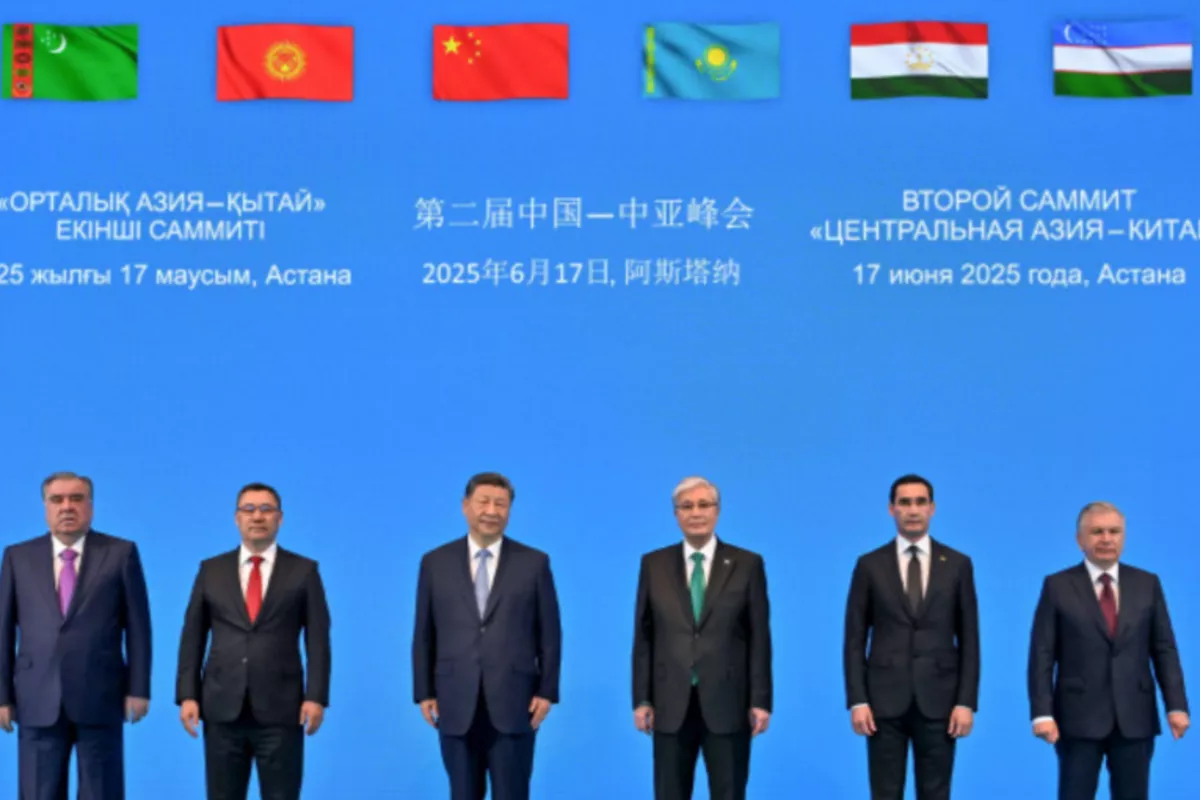
Second China-Central Asia Summit: from left, presidents Emomali Rahmon, Sadyr Japarov, Xi, Tokayev, Berdimuhamedov and Mirziyoyev. / Akorda.kz
On June 17, Chinese President Xi Jinping signed a treaty aimed at further strengthening China’s relations with the five Central Asian countries.
At a summit held in the Kazakh capital of Astana, Xi made it plain that Beijing is keen to further expand and deepen cooperation across areas including trade, goods transit, energy and infrastructure, The Caspian Post reports citing foreign media.
His visit comes at a time when Russia is struggling to maintain and develop its political and economic links with Central Asia, a traditional sphere of influence for Moscow, given the distraction of its longrunning war with Ukraine and concentration on fuelling its war economy. As well as China, the major EU nations, the US, the UK and South Korea are among those looking to increasingly move in on opportunities in Central Asia, including the mining of its plentiful resources of critical minerals.
In Astana, Xi signed a treaty of "permanent good-neighbourliness and friendly cooperation" with the leaders of Kazakhstan, Kyrgyzstan, Tajikistan, Turkmenistan and Uzbekistan, China's official Xinhua news agency reported.
The China-Central Asia summit is the second of its kind. The first was a pomp-filled affair that took place in northwest China in 2023.
Central Asia has a population of around 80mn people, with around 20mn in Kazakhstan and approximately 37mn in Uzbekistan.
"At present, the world is undergoing accelerating changes unseen in a century, entering a new period of turbulence and transformation," Xinhua quoted Xi as saying in a speech at the summit.
"Trade wars and tariff wars produce no winners, and unilateralism, protectionism, and hegemonism are bound to harm both others and oneself," he said. The remarks will be taken as a hardly disguised swipe at the US, which has engaged in a series of confrontations over tariffs with Beijing since Donald Trump returned to the White House in January.
"China is ready to work with Central Asian countries to safeguard international justice, oppose hegemonism and power politics," Xi added.
Announcing 1.5bn yuan ($208.9mn) in grant assistance to the Central Asian countries from Beijing this year to back livelihood and development projects, Xi called for more cooperation in trade, minerals, agriculture and other areas.
Xinhua, quoting Chinese Customs data, said China's two-way trade with the five Central Asian countries totalled a record 286.42bn yuan ($39.86bn) from January to end-May. That marked a 10.4% y/y expansion.
Turkmenistan is the only Central Asian country that has a trade surplus with China. That is because of its major piped gas deliveries to the world’s second largest economy. Economically, sustaining these deliveries is make or break for the Turkmen.
In a meeting with Turkmen President Serdar Berdimuhamedov, Xi, as per Reuters, said "both sides should expand the scale of natural gas cooperation, explore cooperation in non-resource fields and optimise trade structure."
In encounters with Uzbek President Shavkat Mirziyoyev and Kyrgyz President Sadyr Japarov, Xi urged progress on the China-Kyrgyzstan-Uzbekistan (CKU) railway, a project first conceived in the 1990s but only this year given a construction start. If established, it could rival usual transit routes running East-West via Kazakhstan.
In Kyrgyzstan, China Road and Bridge Corporation is modernising the country’s largest airport, Manas International Airport in Bishkek. It is also set to upgrade the country’s second-largest airport, Osh. The company has, meanwhile, been invited to build a completely new airport in Jalal-Abad. China looks set to pay for that project.
In a meeting with Tajik President Emomali Rahmon, Xi emphasised that China stands as a trustworthy neighbour and partner of Tajikistan and firmly supports Dushanbe in safeguarding its national independence, sovereignty and security, reported Xinhua. Like China, Tajikistan shares a border with conflict-riven Afghanistan. Tajikistan has fragile relations with the ruling Taliban in Kabul. However, like Kyrgyzstan, it boasts a Russian military base, so in the area of defence and security in these two countries, particularly as regards Tajikistan given Beijing's own nervousness over instability in Afghanistan, China's role is closely watched by Central Asia analysts.
Xi and Rahmon both welcomed the start of direct flights between Dushanbe and Beijing, reported Asia-Plus.
As reported by Radio Azattyk, in his speech at the summit Kazakh President Kassym-Jomart Tokayev observed that Central Asia’s ties with China have withstood the test of time.
"Multifaceted cooperation with China plays a key role in this positive process. I would like to emphasise that relations between Central Asia and China have risen to the level of an eternal, adaptable and comprehensive strategic partnership," Tokayev reportedly said.
Tokayev-who congratulated Xi on his 72nd birthday, which occurred on June 15-added: “I am confident that thanks to your wise policy, the People's Republic of China will achieve great success in socio-economic modernisation and improving the well-being of its citizens. We are sincerely pleased with the great achievements of the Chinese people, who are building socialism with their own characteristics in a new historical period.”
Relations between Kazakhstan and China were boosted this week when Astana said that although it was selecting Russia for the building of its first nuclear power plant, it planned to award the main contractor contract for a second plant to a Chinese company, CNNC.
Share on social media